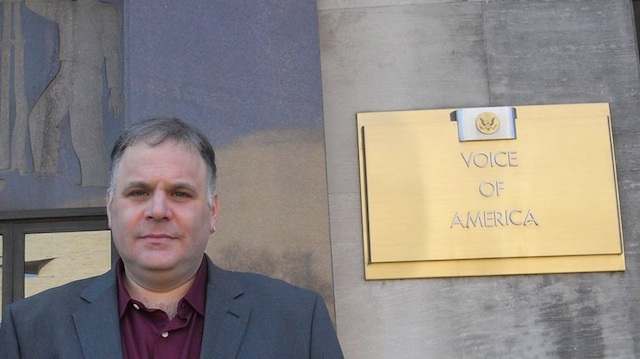BBG Watch Commentary
 PCJ Radio Int. based in Taiwan has produced and aired a Special Voice of America Newscast which is a spoof on the bungled decision by the Washington bureacracy to end numerous VOA shortwave broadcasts to Asia and the Middle East without letting audiences know about it well in advance. SEE: Bureaucrats gave listeners little time to learn about shortwave cuts by VOA, RFA, and RFE/RL, BBG Watch, June 28,2014.
PCJ Radio Int. based in Taiwan has produced and aired a Special Voice of America Newscast which is a spoof on the bungled decision by the Washington bureacracy to end numerous VOA shortwave broadcasts to Asia and the Middle East without letting audiences know about it well in advance. SEE: Bureaucrats gave listeners little time to learn about shortwave cuts by VOA, RFA, and RFE/RL, BBG Watch, June 28,2014.
The person behind this satire is Keith Perron. He has been active in international broadcasting since 1989, including work at Radio Canada International, China Radio International, Radio Deutsche Welle. He has freelanced for Radio Netherlands, Monitor Radio, ABC Radio (Australia) and others. He is currently the director of PCJ Radio International where he is also an announcer and producer.
Perron has been a strong supporter of Voice of America broadcasting to the world. In April 2014, he wrote an open letter to the Broadcasting Board of Governors (BBG) Chairman Jeff Shell with an appeal for continuing and improving Voice of America radio broadcasts. Perron focuses his own broadcasts on those parts of the world, particularly China, which experience political repression and Internet censorship or where most of the population does not have adequate access to digital communications technology or may be too poor to afford it. SEE: Shortwave radio – getting message across borders without censorship, BBG Watch, April 23, 2014.

The PCJ Radio Int. spoof may be a little unfair to VOA Director David Ensor who reportedly himself found out only Thursday night from the BBG’s International Broadcasting Bureau (IBB) executives that the shortwave radio cuts would go into effect in a few days. On the other hand, David Ensor knew that some of these cuts were coming. At the very least, he should have demanded that their implementation be postponed until audiences could be properly notified. Whether he did or not, we do not know. What we do know is that Voice of America, and especially its news reporting, is in the midst of a major management crisis.
VOA broadcasters who produce these programs were caught completely off guard by the decision to pull them off shortwave radio in just a couple of days. They were given no time to prepare and no time to tell their audience. There was no VOA-wide announcement issued to the staff that these shortwave broadcasts would end on June 30. Many VOA employees still have no idea that this will happen in just one day.
Thank you shortwave listeners of Daybreak Asia and China Focus. I had less notice we’re off the air than many of you. #blindsided
— Jim Stevenson (@VOAStevenson) June 29, 2014
#VOA will abruptly cease English language shortwave #radio transmissions to #Asia after tomorrow (Monday).
— Steve Herman (@W7VOA) June 29, 2014
Another good reason Director Ensor should have insisted that the implementation of these shortwave radio broadcasts cuts be postponed is the bipartisan Royce – Engel U.S. International Broadcasting Reform Legislation, H.R. 4490, the United States International Communications Reform Act, introduced by Rep. Ed Royce (R-CA), Chairman of the House Foreign Affairs Committee, and Rep. Eliot Engel (D-NY) Ranking Member, to reform and transform the Broadcasting Board of Governors. The H.R. 4490 contains the following amendment attached to the bill by Congressman Alan Lowenthal (D-CA). Rep. Lowenthal has the largest Cambodian American community in the U.S. in his district, as well as a large Vietnamese American community.
This is the amendment to H.R. 4490 which was approved unanimously by the House Committee on Foreign Affairs.
“Shortwave broadcasting has been an important method of communication that should be utilized in regions as a component of United States international broadcasting where a critical need for the platform exists.”
###
Special VOA Newscast on PCJ Radio Int.
As you might be aware the Broadcasting Board of Governors has taken the very wise decision to end all Radio Free Europe, Radio Liberty, Radio Free Asia and VOA English broadcasts.
On June 29, 2014 at 1230UTC PCJ Radio International will broadcast a Voice of America newscast that the VOA management pulled from it’s schedule. It includes the spokesperson for the Broadcasting Board of Governors and an interview with David Ensor the director of the Voice of America.
This is a VOA Newscast about the cuts expected to take place.
BACKGROUND
Some time ago, International Broadcasting Bureau (IBB) executives working for the U.S. federal agency, the Broadcasting Board of Governors (BBG) in charge of taxpayer-funded international broadcasts, had proposed cutting numerous Voice of America (VOA), Radio Free Asia (RFA) and Radio Free Europe / Radio Liberty (RFE/RL) shortwave transmissions to Asia and the Middle East. The proposal was approved by the bipartisan BBG board and sent by the Obama Administration to the U.S. Congress as part of the agency’s budget request. Journalists knew that some of these cuts might happen if Congress approved the BBG budget, but what they did not expect was to be told suddenly by IBB last Thursday night that the cuts will be implemented on June 30. In fact, the IBB announcement went just to the heads of these media outlets. Many VOA program producers still did not know about it on Friday and Saturday. Of course, VOA shortwave radio audiences in Asia had no idea that they will lose their programs in a couple of days and many still don’t since IBB and VOA failed to issue official announcements.
Everyone knows that IBB bureacrats propose these radio cuts to protect their own highly-paid positions in Washington. In the last seven years, the number of IBB bureaucratic jobs increased 37% while numerous broadcasts were being cut. Unfortunately, various BBG boards went along with these program cuts, showing no concern for audiences that cannot afford access to the Internet or see the Internet blocked by repressive regimes. The official IBB explanation is that the agency needs to transition to digital media, as if radio on the Internet was not already digital. Voice of America is already digital, but its management proved itself to be incapable of delivering news and multimedia content in an attractive and most efficient way to people who most need it.
After spending millions of dollars on their “digital projects” and destroying VOA’s news reporting, IBB and VOA executives have delivered the VOA English News Twitter account that has fewer followers (106K as of June 29, 2014) than the UN Peacekeeping Force Twitter (126K as of June 29, 2014). Even the State Department Twitter account has close to one million followers (962K as of June 29, 2014); some members of Congress have more than VOA English News; BBC, CNN, and NYT have several million each. Russia’s RT Twitter has 679K Twitter followers as of June 29, 2014.
The Voice of America’s niche has always been providing news to the most disadvantaged and most oppressed nations and communities around the world, but IBB and VOA executives are trying to change this model and turn VOA into a regular, commercial global news outlet like CNN. Their plan is not working. The U.S. Congress wants to reform the entire agency, but especially the International Broadcasting Bureau and the Voice of America.
In the meantime, audiences in Asia and the Middle East are about to lose their VOA shortwave radio broadcasts without any prior announcement. That’s how much these IBB bureacrats think about radio listeners.